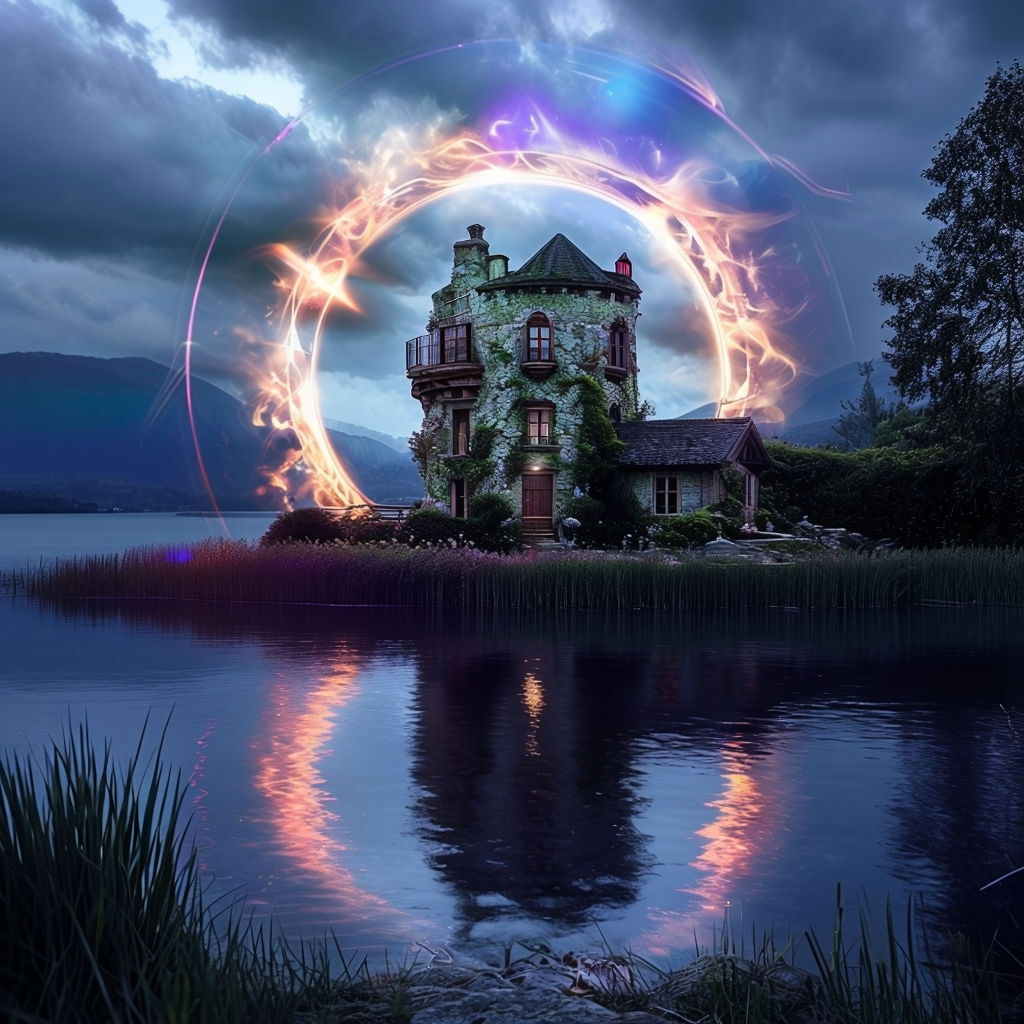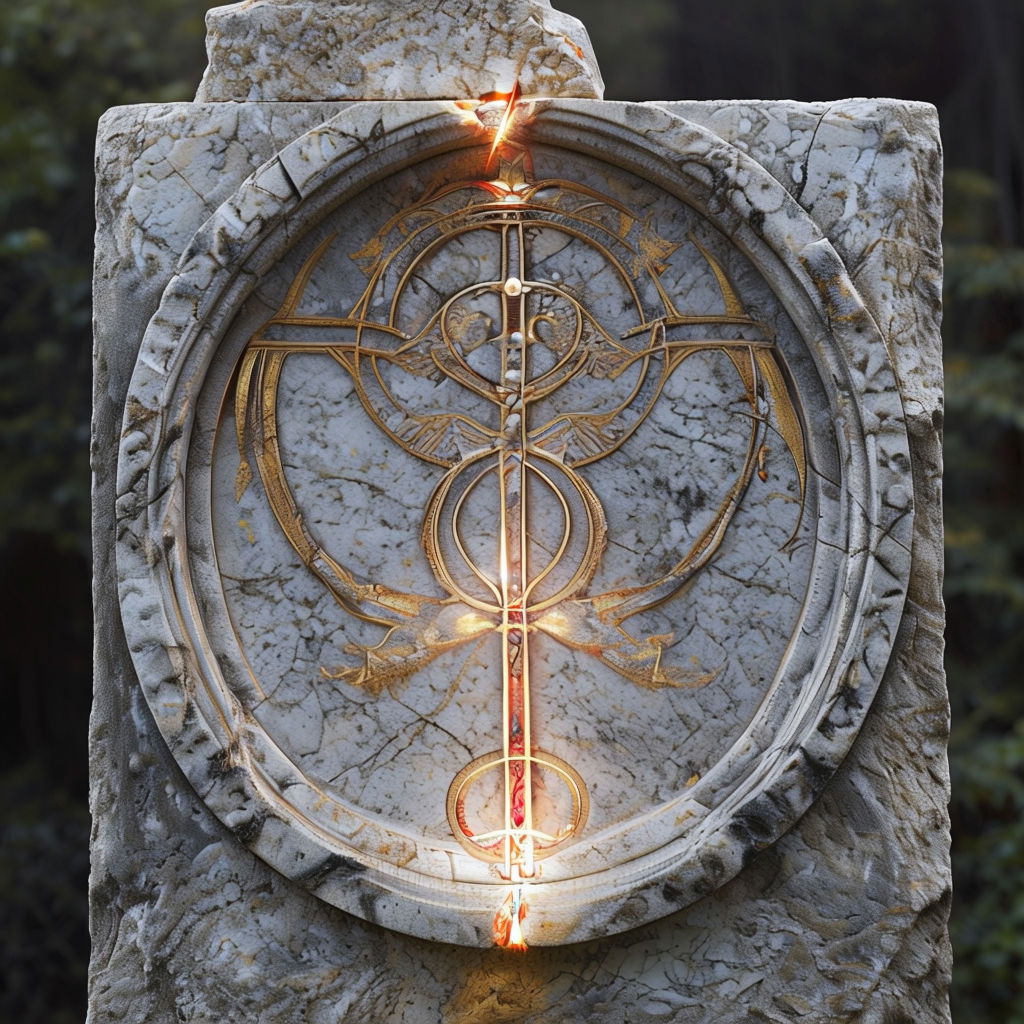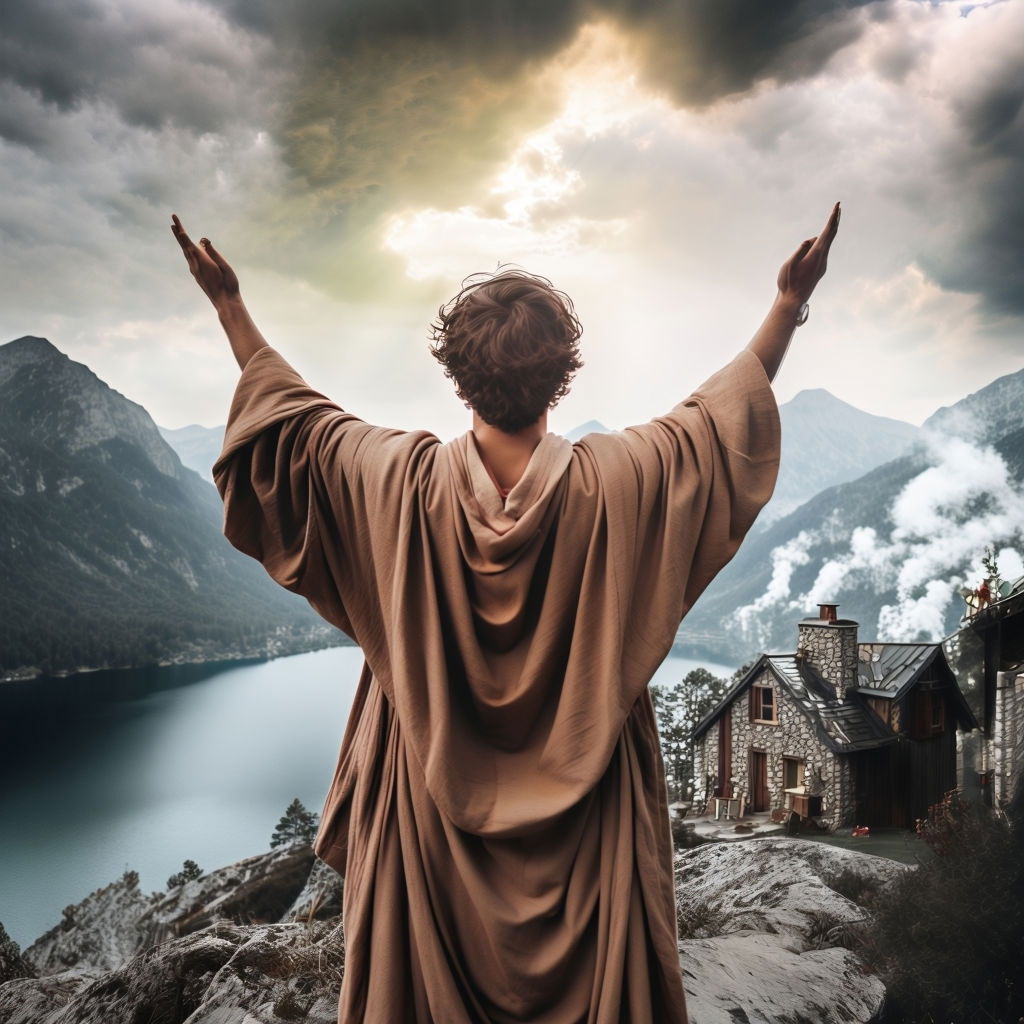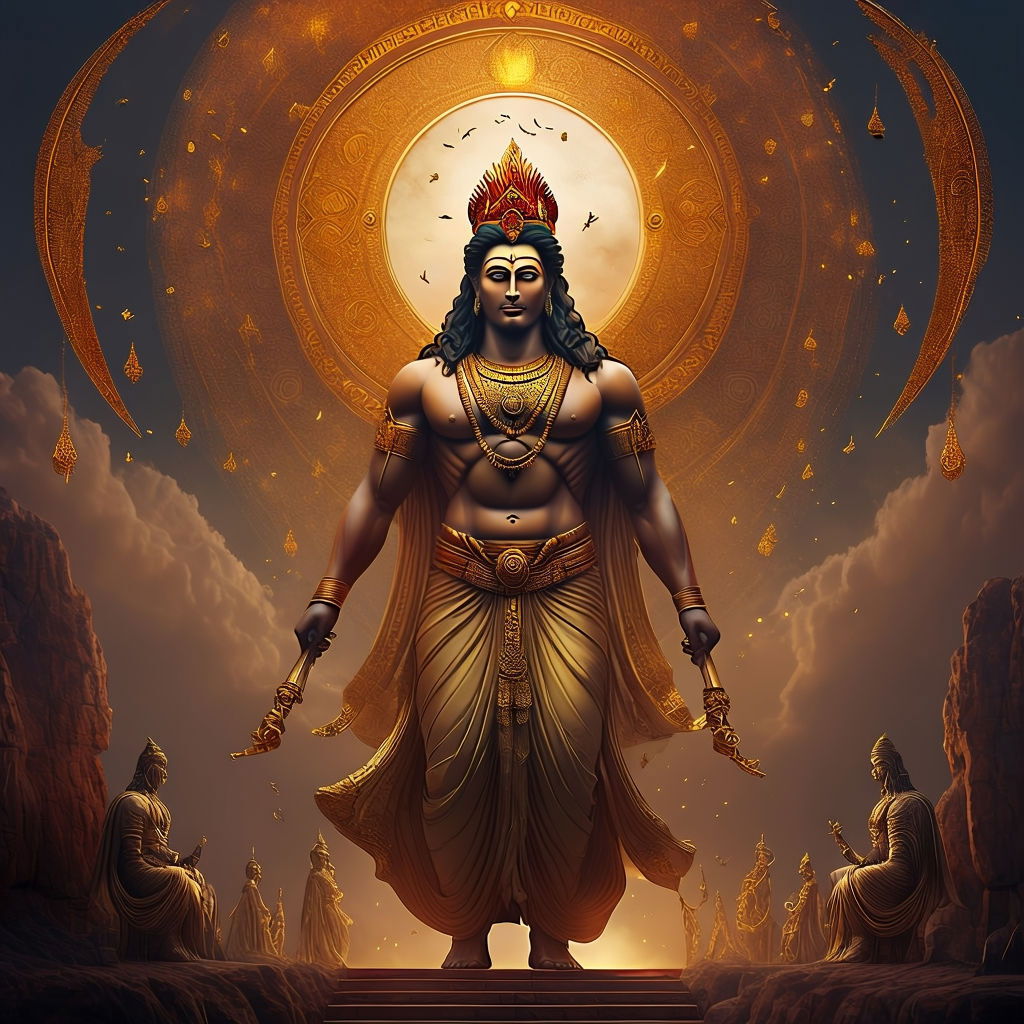Tegedao The Joker's Gnosis
In the Shadow of Bollingen : The Wizard and the Fool
A STORY WRITTEN BY TEGEDAO OF COURSE
The Tower House at Bollingen, nestled by the serene waters of Lake Zurich, was a sanctuary of stone and silence. Built with his own hands, Carl Jung’s retreat was a place where the mind could wander unencumbered by the distractions of the modern world, where the soul could breathe freely in the embrace of nature’s simplicity. Here, among the sturdy walls and sparse furnishings, Jung had crafted not merely a home but a temple to the symbolic life, a life of depth, of meaning, of connection to the vast, unseen currents that run beneath the surface of our existence.
In the early 1960s, a visitor came to this place, seeking more than just a conversation with the famed psychologist. Tegedao, a wandering soul searcher from Sweden, arrived with the weight of his own questions, a man who bore the title of “Joker” like a mantle, an archetypal identity that was at once a shield and a revelation. Tegedao believed himself to be a living symbol, embodying the paradoxes of life, the laughter and the sorrow, the absurdity and the profundity of the human experience. He came to Bollingen not to learn, but to confirm—to match his understanding of the cosmic joke with that of the old wizard who had spent his life unraveling the mysteries of the mind.
Jung welcomed Tegedao with a knowing smile, his eyes reflecting the deep, mysterious waters of his own soul. They walked together around the Tower, its rough stones warmed by the sun, its shadows long and cool. The air was thick with the scent of pine and earth, the quiet hum of life. Tegedao spoke of his identity as the Joker, the archetype of the taboo, the embodiment of the eternal question that gnawed at the fabric of reality: Who are we, really? Jung listened, the corners of his mouth twitching with the hint of a smile, as if he recognized in Tegedao a fellow traveler on the path of individuation, a journey that led not outward, but inward, to the very core of the self.

“You speak of the Joker,” Jung said, his voice as measured and deliberate as the stones of his Tower, “and I see in him the mirror of the Gnostic, the one who knows, who has tasted the divine spark within. But tell me, Tegedao, do you lead a symbolic life?”
“Yes,” Tegedao answered, his voice steady, “I am the Joker. That is my magnum opus, my identity forged in the fires of understanding. Life, to me, is a cosmic joke, a dance of consciousness that plays in the vastness of the unknown. I am the laughing Gnostic, knowing that consciousness is but a vessel of an ‘outer space consciousness,’ unlimited and eternal, in oneness with the Dao.”
Jung nodded, his expression inscrutable. “Then you understand,” he said, “that the symbolic life is not a choice, but a necessity. Without it, we are trapped in the banal, grinding mill of existence, ‘nothing but’ our roles, our masks. To live symbolically is to step beyond, to touch the infinite.”
The two men continued their walk, their dialogue flowing like the lake’s gentle waves, each word a ripple in the deep waters of the psyche. Tegedao, the young mystic, and Jung, the elder wizard, found a resonance in their thoughts, a shared understanding that transcended age, experience, and even death. For Jung knew his time was near; the Tower had been his retreat, his place of contemplation, but also his preparation for the final journey.
Shortly after their meeting, Jung passed away, leaving behind a legacy that would ripple through the ages, a beacon for those who sought not just knowledge, but wisdom. Tegedao, grieving yet assured, held close the manuscript Jung had given him, Liber Novus, the Red Book, a testament to the inner journey that Jung had undertaken, and now, so too would Tegedao.
The Joker’s life continued, his laughter echoing in the halls of the symbolic, his consciousness ever expanding, ever creating, a testament to the truth he and Jung had both known: that reality itself is but a hologram, a creation of the mind, and that within the endless ether, the archetypes of the Joker and the Wizard would meet again, in the spaces between dreams, in the depths of the soul.

--
As the sun dipped low over Lake Zurich, casting a golden hue across the tranquil waters, Carl Jung and Tegedao walked side by side through the grounds of the Tower House. The Tower, with its rough-hewn stones and minimalist structure, stood as a testament to Jung's belief in the necessity of a symbolic life—a life where simplicity gave way to profound depth, where the outer world reflected the rich inner landscape of the psyche.
Tegedao, dressed in a simple tunic that mirrored the serenity of the surroundings, looked out at the lake, his mind swirling with thoughts that had long simmered beneath the surface. Jung, with his quiet presence, seemed to draw these thoughts out, as though the very air around him was charged with the potential for revelation.
“Master Jung,” Tegedao began, his voice soft yet filled with an urgency that belied his calm demeanor, “in this place, where the world seems to fall away, I feel the weight of all that is unsaid within me. I am the Joker, a symbol of the cosmic absurdity of life. I wear the mask, I dance the dance, yet I cannot shake the feeling that behind it all, there is something more—something that defies the very joke I’ve built my identity upon.”
Jung paused, considering Tegedao’s words. He turned his gaze to the Tower, its silhouette stark against the fading light. “The Joker,” Jung said, “is a powerful archetype. It is the embodiment of the trickster, the one who subverts, who reveals the hidden truths through the absurd. But you must remember, Tegedao, that every archetype is but a fragment of the whole. The Joker is not the end; it is a doorway.”
“A doorway to what?” Tegedao asked, his eyes narrowing as he searched Jung’s face.
“To the Self,” Jung replied, his voice low and resonant. “The true Self, which lies beyond all masks, all identities, all roles. The Joker is a necessary stage, a way to break free from the rigid structures of the world, to see the fluid, ever-changing nature of reality. But if you stop there, you remain trapped in the very joke you seek to transcend.”
Tegedao’s brow furrowed. “Then how do I go beyond? How do I step through this doorway and into the light that I sense but cannot fully grasp?”
Jung smiled, the kind of smile that carried the weight of a lifetime of understanding. “The answer lies not in rejecting the Joker, but in integrating it. You see, Tegedao, the symbolic life is not about choosing one mask over another. It is about recognizing the symbolic nature of all things, and through that recognition, finding the unity that underlies the multiplicity.”

They continued to walk, the soft crunch of gravel beneath their feet the only sound breaking the evening stillness. Tegedao pondered Jung’s words, feeling the truth of them settle in his heart like a stone dropped into deep water.
“You’ve spoken of Gnosticism,” Tegedao said after a long silence, “of the divine spark within, the gnosis that leads to true knowledge. Is this spark the same as the Self you speak of?”
Jung nodded. “Indeed, the divine spark is the essence of the Self. It is the light that shines in the darkness, the part of us that is connected to the eternal, the infinite. Gnosis is not mere intellectual knowledge; it is a deep, experiential knowing. It is the realization that we are not separate from the cosmos, but a part of it, that our consciousness is not limited, but boundless.”
Tegedao’s eyes brightened as he grasped the connection. “And the Joker’s laughter—could it be the sound of that spark, the joy of recognizing the absurdity of separation?”
Jung’s smile deepened. “Yes, Tegedao. The Joker’s laughter is the laughter of the divine, the laughter of the cosmos at play. It is the realization that all our struggles, all our fears, are but a game—a dance of opposites, a play of light and shadow. To know this, to truly know this, is to touch the essence of the Self, to live in the light of the symbolic life.”
They reached the edge of the lake, where the water lapped gently at the shore. Tegedao looked out over the vast expanse, feeling the truth of Jung’s words resonate within him, as if the lake itself were a mirror reflecting the depths of his own soul.
“Master Jung,” Tegedao said, his voice filled with a newfound clarity, “I came here seeking answers, and I leave with a deeper question. How do I live this symbolic life, in the world beyond these serene waters, in the chaos and noise of everyday existence?”
Jung turned to him, his gaze piercing yet compassionate. “You live it, Tegedao, by becoming aware of the symbols that surround you, the symbols that arise within you. By seeing the world not as a collection of isolated events and objects, but as a living tapestry woven with meaning. The symbolic life is a life of awareness, of mindfulness, of seeing the sacred in the mundane. It is the life that steps beyond the ordinary into the extraordinary, where every moment, every encounter, is filled with the potential for transformation.”
Tegedao nodded, feeling a sense of peace settle over him, a peace that was not the absence of questions, but the presence of a deeper understanding. “And the Joker?” he asked, a playful glint in his eye. “What becomes of him in this symbolic life?”
Jung chuckled softly. “The Joker, Tegedao, continues to dance, continues to laugh. But now, he laughs with the knowledge that he is not merely a player in the game, but also the observer, the one who knows. The Joker becomes the wise fool, the one who sees the truth behind the masks, and in that seeing, finds freedom.”
They stood together in silence, the last light of the day casting a warm glow over the lake. Tegedao felt a deep connection to this place, to this moment, as if he had found something he had been searching for all his life. He knew that the path ahead would not be easy, that the symbolic life was a continual journey, a daily practice of seeing beyond the surface.
But he also knew that he was not alone. The wisdom of the old wizard would guide him, the laughter of the Joker would sustain him, and the light of the divine spark within would lead him home, to the Self, to the infinite.
And as the first stars began to twinkle in the twilight sky, Tegedao smiled—a smile that carried the weight of both sorrow and joy, of knowledge and mystery. It was the smile of one who had glimpsed the truth, and who was ready to walk the path of the symbolic life, wherever it might lead.
For in that moment, Tegedao understood that the journey was the destination, and that every step, every breath, was a step closer to the wholeness he sought. The Joker and the Wizard had become one, and in that union, Tegedao found the peace he had longed for, the peace of knowing that he was, and always had been, enough.

HOLOSOPHY!